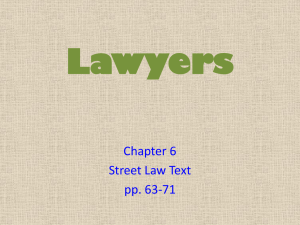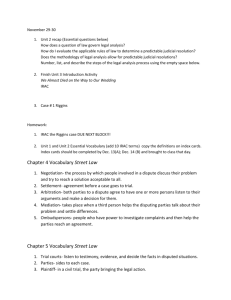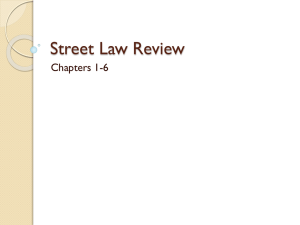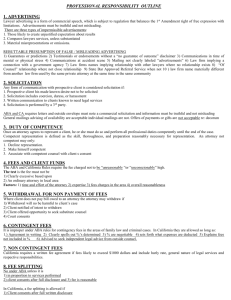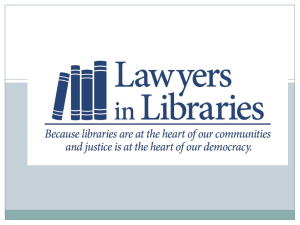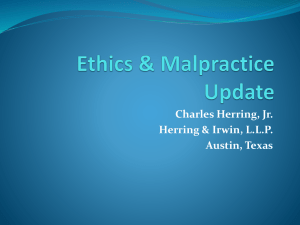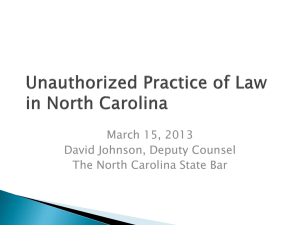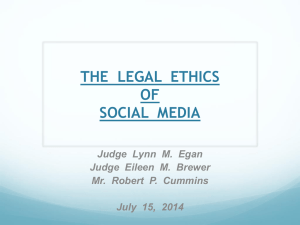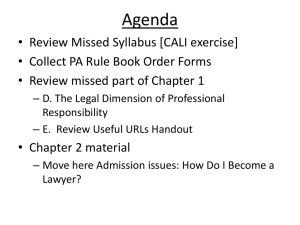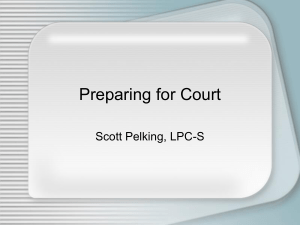Chp 6 Powerpoint - McCook Public Schools
advertisement
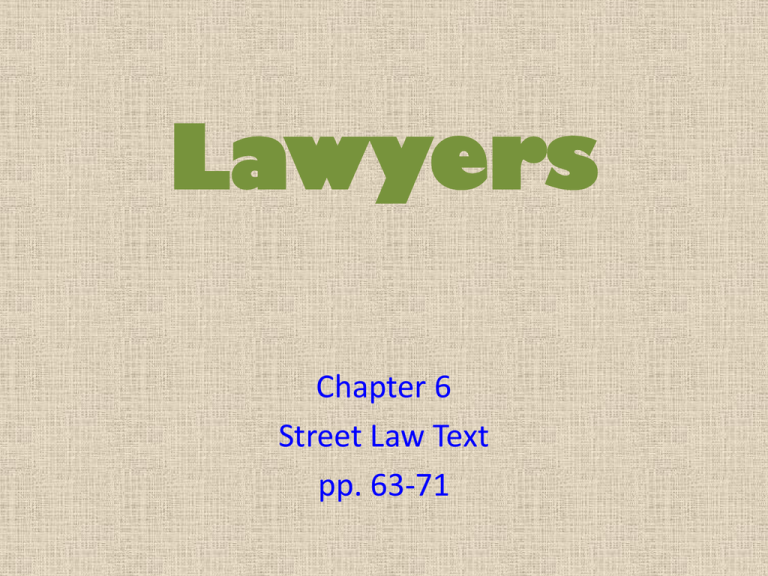
Lawyers Chapter 6 Street Law Text pp. 63-71 • There are more than 1,000,000 lawyers [attorneys] in the United States. • 70% are in private practice, 10% work for the government, 10% for business and unions, less than 6% for public interest, and the smallest percentage are professors, judges, and elected officials. • Most lawyers rarely if ever go to court. The give advice, draft legal opinions, negotiate settlements, and provide out of court assistance. • Litigators-are lawyers that go to court- or are trial attorneys. When Do You Need a Lawyer • It is best to have preventative advice, don’t always wait until you are in trouble before you get an attorney. Examples of when you might want an attorney’s advice: • • • • • • • Buying or Selling a home Organizing a Business Changing your family status (divorce or adoption) Making a will or planning an estate Handling accidents involving personal injury or property damage Signing a large or important contract Defending a criminal charge or being sued • Many Bar Associations- or organizations that license lawyers; as well as other groups can help you decide if you need a lawyer. Problem 6.1 For each of the following situations, discuss the reasons you may or may not need a lawyer. a. b. c. d. e. f. g. h. i. j. You hit another car in a parking lot. Your insurance agent indicates that the company will pay for bodily injury and property damage. You borrow a friend's car without his knowledge, and he reports it to the police as stolen. You buy a new stereo for $500. One month later, the receiver and speakers blow out. You return to the store, and the salesperson tells you he is sorry but his stereos have only a two week guarantee. You decide to trade in your old car and buy a new one. Two friends are caught robbing the cashier at a local store, and they name you as someone who helped plan the robbery. The principal suspends you for two days because of an article you wrote for the student paper criticizing the school dress code. You are turned down when you apply for a job. You think you were rejected because you are deaf. You do not want your family to inherit the $10,000 you have saved. After being told you will die within a year, you want the money to be used for cancer research. You and your spouse can no longer get along. You want a divorce. You earn 5,000 working in a restaurant during the year. You want to file your federal income tax return. • The best way to find a lawyer to represent you is usually through “word of mouth”, a recommendation by a friend or colleague. • You can look up lawyers in the phone book, on the internet, or hire one through their tv or other media advertising. But always do some background checking on who you hire to see if they have a positive track record. • Many Bar Associations maintain lists of lawyers who specialize in certain kind of cases. • For many years lawyers and law firms were not allowed to advertise but today we know commercials on tv and the internet are common place. Problem 6.2 a. A television advertisement shows a lawyer in a bathing suit coming out of a lake. He says, “If you’re in over your head because of bad debts, let us bail you out. We’re the best firm in the state.” Should there be any restrictions on ads like this? If so, what? Should there be other restrictions on ads? If so, what should they be b. A lawyer hears that many people have been injured as a result of accidents in a particular type of car. He runs a newspaper ad showing a car crash. The ad reads. “If this happens to you, I may be able to help you recover your losses.” Should the lawyer be able to do this? c. Many people in a city have lost their jobs and could lose their homes because they cannot make their monthly mortgage payments. Jane, a lawyer, writes to all of them saying she is willing to represent them to prevent the loss of their homes. Should she be allowed to do this? • Hiring attorneys is expensive, make sure before securing the services of an attorney you have an understanding of their fees. You will probably also be charged for even inquiring about your case with an attorney, but it is usually a set reduced fee from what the attorney normally charges. – Some types of fees • Flat rate- usually used for a simple will or other legal filling that is very quick to finish • Hourly rate- Many lawyers charge well over $100 an hour and only bill by the hour [so a 2 minute phone call would cost $100] • Contingency Fee- only get paid if they win. But they will usually take from 30% to 60% of the settlement. • Retainer- a down payment to retain their services. Also some companies and individuals pay a monthly retainer to an attorney to hold their services [or to make sure they will be available to work on their case] • Fees are negotiable and subject to the approval of both the attorney and client…. If you don’t like an attorney’s fees… shop around! Try to get your agreement for fees in writing, with an estimate of total expenses. Working with Your Lawyer • Trust is the foundation of the attorney-client relationship. You must be totally honest with your lawyer so they can best help you. • [attorney-client] Privilege- means whatever you tell your attorney they must not disclose it to anyone without your permission • The attorney will advise you on your best options but in the end it is, and by law is, your decision. • Lawyers must follow a Code of Professional Responsibility enforced by the State Bar Associations and State Supreme Courts. • A lawyer must pass a test to become a member of the state bar. • If a lawyer violates the standards of conduct they may be reprimanded, suspended, or Disbarred- removed from the bar… no longer able to practice law. • Legal Malpractice- is when an attorney makes a serious error in representing their client. Problem 6.4 The following situations present ethical dilemmas faced by attorneys. Read the Code of Professional Responsibility, examine each case, and decide whether the attorney acted ethically or unethically. Explain your answers. a. Marta, an attorney for the family of a man killed in an auto accident, visits a bar and runs into a juror in the case. She has a drink with the juror. b. Nicholas, a criminal defense attorney, puts his client on the stand to testify to her innocence, even though Nicholas knows she is lying. c. Gene, a corporate lawyer, is asked by a wealthy client to recommend her son for admission to the state bar. Gene says yes. d. Rosa represents a man injured by a defective lawn mower. The manufacturer’s insurance company offers a $100,000 settlement. She accepts the settlement without consulting her client. e. Nang, an attorney, has a trial next week before Judge DeSilva. Nang sees the judge in a grocery store and asks her if the trial can be postponed one week.

